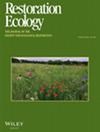Invertebrate responses to rewilding: a monitoring framework for practitioners
IF 2.8
3区 环境科学与生态学
Q2 ECOLOGY
引用次数: 0
Abstract
Rewilding presents a unique opportunity to better understand the processes influencing ecological communities and how they function. Although empirical evidence on the effects of rewilding is growing rapidly, knowledge gain is unbalanced, particularly for invertebrates, despite this group representing a large proportion of biodiversity and being fundamental to key ecosystem processes. Here, we advocate for more targeted systematic monitoring and experimental research, providing a site‐based framework for practitioners to evaluate project effects on invertebrate biodiversity. This framework utilizes taxonomic indicators of change, representative of processes important to ecosystem functioning. Implementation of this framework and the associated opportunities and challenges for practitioners are discussed. Adopting this framework would broaden the taxonomic groups and ecosystem processes evaluated by rewilding projects, transform the sector from opinion‐based to evidence‐based, and help address some of the most pressing ecological and conservation questions of the twenty‐first century.无脊椎动物对野化的反应:从业人员监测框架
野化为更好地了解影响生态群落的过程及其功能提供了一个独特的机会。尽管有关野化影响的实证证据正在迅速增加,但知识的获得并不平衡,尤其是无脊椎动物,尽管该群体在生物多样性中占很大比例,并且是关键生态系统过程的基础。在此,我们提倡开展更有针对性的系统监测和实验研究,为实践者提供一个基于现场的框架,以评估项目对无脊椎动物生物多样性的影响。该框架采用了分类学变化指标,代表了对生态系统功能非常重要的过程。本文讨论了该框架的实施以及从业人员面临的相关机遇和挑战。采用该框架将扩大野化项目所评估的分类群组和生态系统过程,将该领域从以观点为基础转变为以证据为基础,并有助于解决21世纪最紧迫的一些生态和保护问题。
本文章由计算机程序翻译,如有差异,请以英文原文为准。
求助全文
约1分钟内获得全文
求助全文
来源期刊

Restoration Ecology
环境科学-生态学
CiteScore
6.50
自引率
15.60%
发文量
226
审稿时长
12-24 weeks
期刊介绍:
Restoration Ecology fosters the exchange of ideas among the many disciplines involved with ecological restoration. Addressing global concerns and communicating them to the international research community and restoration practitioners, the journal is at the forefront of a vital new direction in science, ecology, and policy. Original papers describe experimental, observational, and theoretical studies on terrestrial, marine, and freshwater systems, and are considered without taxonomic bias. Contributions span the natural sciences, including ecological and biological aspects, as well as the restoration of soil, air and water when set in an ecological context; and the social sciences, including cultural, philosophical, political, educational, economic and historical aspects. Edited by a distinguished panel, the journal continues to be a major conduit for researchers to publish their findings in the fight to not only halt ecological damage, but also to ultimately reverse it.
 求助内容:
求助内容: 应助结果提醒方式:
应助结果提醒方式:


